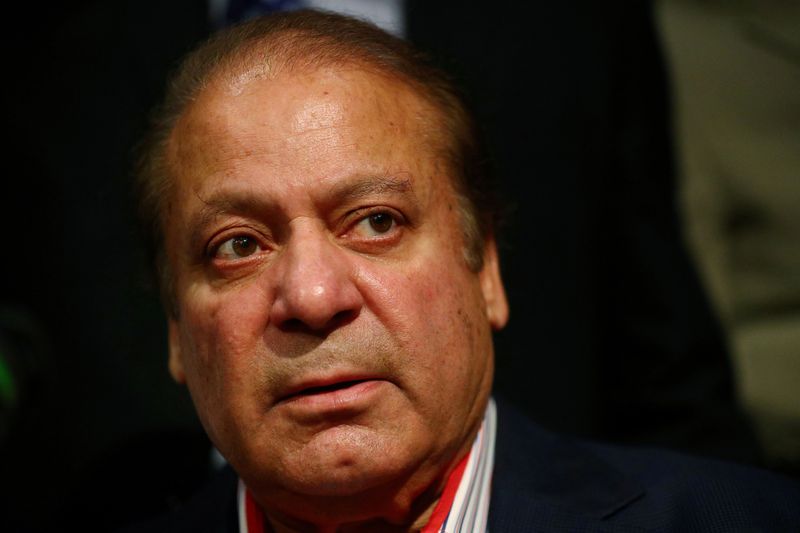Pakistan’s three-time premier Nawaz Sharif arrives home from exile
2023.10.21 12:27

© Reuters. FILE PHOTO: Ousted Prime Minister of Pakistan, Nawaz Sharif, speaks during a news conference at a hotel in London, Britain July 11, 2018. REUTERS/Hannah McKay/File Photo
By Asif Shahzad and Mubasher Bukhari
ISLAMABAD (Reuters) -Pakistan’s three-time Prime Minister Nawaz Sharif arrived home on Saturday from four years of self-imposed exile in London, aiming to kick start his party’s campaign for next year’s election and targeting former premier Imran Khan as the biggest rival.
The 73-year-old veteran politician returned to his eastern hometown of Lahore, where he will lead a rally hours after his chartered plane landed in Islamabad carrying more than 150 people from his party and media organisations, the party and sources said.
Local TV news channels showed Sharif disembarking from a helicopter at a helipad close to the Minar-e-Pakistan monument where thousands of his supporters were waiting for his address.
During a brief stay in the Islamabad airport lounge he signed and filed appeals against the convictions he was jailed for before he left the country in 2019.
“The process to sign and verify legal documents have been completed,” close aide Ishaq Dar posted on X, formerly known as Twitter.
Rallies from various regions of the South Asian country were pouring into Lahore ahead of his arrival, a party spokesperson said. Heavy police contingents were deployed to guard the rally’s venue, said police officer Ali Nasir Rizvi.
Sharif had not set foot in Pakistan since leaving for London in 2019 to receive medical treatment while serving a 14-year prison sentence for corruption. His convictions remain in force, but a court on Thursday barred authorities from arresting him until Tuesday, when he is to appear in court.
While he cannot run for or hold public office because of his convictions, his legal team says he plans to appeal and his party says he aims to become prime minister for a fourth time.
Sharif’s biggest challenge will be to wrestle back his support base from his main rival, Khan, who despite being in jail remains popular following his ouster from the premiership in 2022.
Khan, too, is disqualified from the election because of his August graft conviction, which he has appealed.
ECONOMIC GROWTH
Nuclear-armed Pakistan, a nation of 241 million people, is experiencing the impact of an economic crisis that has worsened during the 16-month rule of Nawaz Sharif’s younger brother, Shehbaz Sharif, who led a coalition government after Khan’s removal.
The elder Sharif has a record of pursuing economic growth and development. When he was removed as premier in 2017, Pakistan’s growth rate was 5.8% and inflation was around 4%. In September, inflation was more than 31% year-on-year and growth is projected to be less than 2% this financial year.
“It is very sad to see that things have deteriorated so badly,” Sharif said before boarding the plane in comments telecast by local TV channels.
Rising living costs have imposed severe pressures on many Pakistanis after the younger Sharif’s coalition government had to agree to harsh fiscal adjustments to resume funding from International Monetary Fund (IMF), which had suspended payments after Khan scuttled a deal in his last days in office.
Nawaz Sharif has said he was ousted from government at the behest of the powerful military after he fell out with top generals, who play an outsized role in Pakistani politics.
He says the military then backed Khan in the 2018 general election. Khan and the military deny this.
The military and Khan fell out in 2022, and over the last few months they have been involved in a bruising showdown, which has afforded Sharif some political space.
The military denies that it interferes in politics.
“An evergreen rule about Pakistani politics is that your chances of taking power are always greater when you’re in the good books of the army,” said Michael Kugelman, director of the South Asia Institute at the Wilson Center.
“Over his long political career, Sharif’s relationship with the military brass has blown hot and cold. It’s now in a relatively cordial phase, and he stands to benefit politically.”








